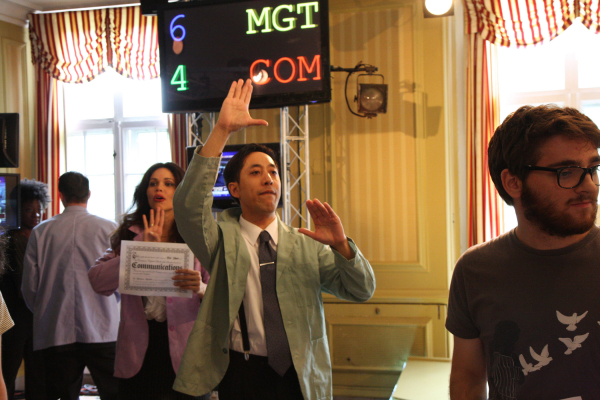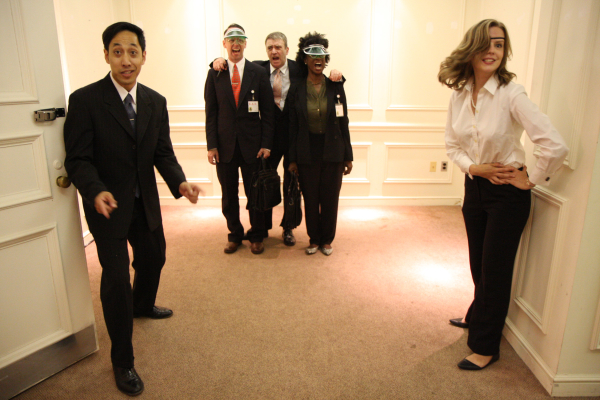The Interactive Theater Production Trade Practices Brings Living Stock Market to Governors Island
Governors Island, the historic former military base in the middle of the East River, doesn't get used very often for theater. This bucolic recreational area between Manhattan and Brooklyn has played house to art exhibitions, concerts, even weddings. But stage performances? Very rare.
Kristin Marting and David Evans Morris are in the process of changing that. Trade Practices, their new environmental theater piece for HERE, is playing house at Pershing Hall, the historic administrative headquarters of the Island. "It's such a cool building, and you probably haven't gotten to see it because they don't have it open very often" says Marting, the director of the interactive live-art piece. "It has these incredible WPA murals that march through American military history and date from the time our fictional company has existed."

(© Carl Skutsch)
That fictional company, called Tender Inc., makes the paper on which United States currency is printed. This notion plays a big part in Trade Practices, which explores the idea of value by placing audiences in a living market where they can buy, sell, and trade six brief performances. "Around 2008 with the crash," scenic designer Morris explains, "I got the idea of the arbitrary nature of money and value. I had this very vague notion about economics and audience, and was looking to create a living market onstage. All you need is people having a conversation about what something's worth, and you, essentially, have a market." These playlets, scripted by Eisa Davis, Erin Courtney, Qui Nguyen, and others, depict Tender's transformation from a family-owned business to a publicly traded corporation that becomes a casualty of the 2008 stock market crash.
As you enter, you're presented with a certain amount of money. Each "episode" (as they call the six plays) presents the same moment in the life of the company, but from the perspective of a different group (owners, managers, workers, and so on). How much future scenes cost depends on the audience members and their desire to buy, sell, or trade. Morris imagines them as investors. "Rather than them buying individual tickets, they invest stock in one of these storylines," he says. "They can buy and sell and trade those stocks. If you did nothing, you'd be committed to one storyline. You have to be proactive to change it around." If it sounds like a Rashomon experience, that's because it is. "We're admirers of the film Rashomon and the way that there are different viewpoints on the same thing that has happened," Marting adds. "This was a way to hit at how all of these different people saw the same issues."
Ultimately, Marting explains, "we were interested in looking at why some things are worth more than others and how a few people's choices can have such a huge impact on the global economy." It even gets a little personal, too: "And how these choices can have impact on someone like me, an artist who doesn't own any stock and doesn't have any money," she concludes. "When we reflect on 2008," Morris adds, "it feels like a small perspective of people held the world's finances in their hands. It's not like one monolithic secret society with an evil board of directors who decided the fate of the world. It was a bunch of independent operators who made a set of decisions that had this massive collective action. I was just interested in how easy it was, relatively speaking, to enact that for our audience."

(© Carl Skutsch)










